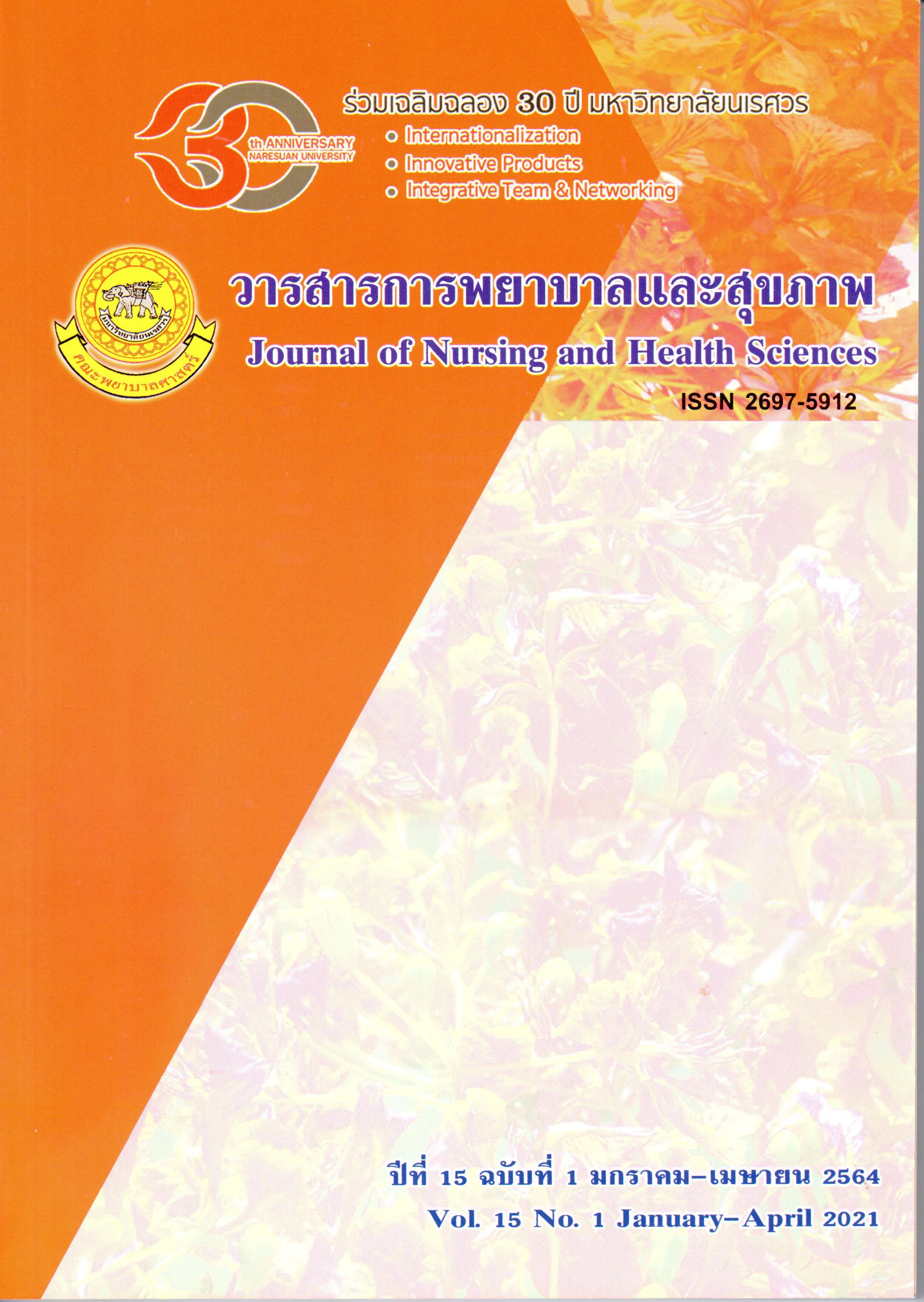ผลของโปรแกรมการผ่อนคลายกล้ามเนื้อแบบก้าวหน้าต่อความเหนื่อยล้าในผู้ป่วยมะเร็งตับ ที่ได้รับเคมีบำบัดทางหลอดเลือดแดง
Main Article Content
บทคัดย่อ
การวิจัยนี้ เพื่อศึกษาเปรียบเทียบความเหนื่อยล้าของผู้ป่วยมะเร็งตับที่ได้รับเคมีบำบัดทางหลอดเลือดแดง ระหว่างก่อนและหลังได้รับโปรแกรมการผ่อนคลายกล้ามเนื้อแบบก้าวหน้า และระหว่างกลุ่มที่ได้รับโปรแกรมฯ และกลุ่มที่ได้รับการพยาบาลตามปกติ กลุ่มตัวอย่างคือผู้ป่วยมะเร็งตับ แบ่งเป็นกลุ่มที่ได้รับการพยาบาลปกติและกลุ่มที่ได้รับโปรแกรมฯ กลุ่มละ 27 ราย โดยโปรแกรมฯ ประกอบด้วย 1.) การประเมินประสบการณ์อาการเหนื่อยล้า 2.) การใช้กลวิธีจัดการอาการเหนื่อยล้า 3.) การประเมินผลลัพธ์ของการจัดการอาการ เครื่องมือที่ใช้ในการเก็บรวบรวมข้อมูลคือ แบบเก็บรวบรวมข้อมูลที่เกี่ยวข้องกับความเหนื่อยล้าและแบบประเมินความเหนื่อยล้าของไปเปอร์และคณะ (Revised Piper Fatigue Scale) วิเคราะห์ข้อมูลโดยการแจกแจงจำนวน ร้อยละ ค่าเฉลี่ย ส่วนเบี่ยงเบนมาตรฐาน สถิติทดสอบไค-สแควร์ สถิติทดสอบฟิชเชอร์ สถิติทดสอบทีแบบกลุ่มเดียว สถิติทดสอบแมน-วิทนีย์ วิเคราะห์ความแปรปรวนแบบวัดซ้ำและทดสอบอิทธิพลย่อยบอนเฟอโรนิ ผลการศึกษาพบว่าความเหนื่อยล้าหลังได้รับเคมีบำบัดทางหลอดเลือดแดงวันที่ 5 ของกลุ่มที่ได้รับโปรแกรมฯ ไม่แตกต่างจากก่อนได้รับโปรแกรมฯ (p > .05) แต่ความเหนื่อยล้าหลังได้รับเคมีบำบัดทางหลอดเลือดแดงวันที่ 14 และ 28 ของกลุ่มที่ได้รับโปรแกรมฯ ลดลงจากก่อนได้รับโปรแกรมฯ (p < .01) และความเหนื่อยล้าหลังได้รับเคมีบำบัดทางหลอดเลือดแดงของกลุ่มที่ได้รับโปรแกรมฯ น้อยกว่ากลุ่มที่ได้รับการพยาบาลปกติในการวัดทั้ง 3 ครั้ง อย่างมีนัยสำคัญทางสถิติที่ระดับ .05ผลการวิจัยนี้แสดงให้เห็นว่าโปรแกรมการผ่อนคลายกล้ามเนื้อแบบก้าวหน้าสามารถใช้เป็นแนวทางในการบรรเทาความเหนื่อยล้าสำหรับผู้ป่วยมะเร็งตับที่ได้รับเคมีบำบัดทางหลอดเลือดแดงได้
Article Details

อนุญาตภายใต้เงื่อนไข Creative Commons Attribution-NonCommercial-NoDerivatives 4.0 International License.
เอกสารอ้างอิง
Artdech, K. (2011). Fatigue management nursing program in adultpatients with cancer: A meta-Analysis. Master Thesis (Nursing), Chulalongkorn University, Bangkok. [In Thai].
Chuangaroon, A., Wongsaichue, C., Linthong, S., & Pojdoung, N. (2020). The Development of nursing service system for primary liver cancer patients receiving transarterial chemoembolization (TACE) at National Cancer Institute. Journal of the Department of Medical Services, 45(2), 184-190. [In Thai].
Charalambous, A. Kaite, O., Constantinou, M., & Kouta. C. (2016). Translation and validation of the Cancer-Related fatigue scale in Greek in a sample of patients with advanced prostate cancer. BMJ, 6, 1-10.
Charalambous, A., Giannakopoulou, M., Bozas, E., Marcou, Y., Kitsios, P., & Paikousis, L. (2016). Guided imagery and progressive muscle relaxation as a cluster of symptoms management intervention in patients receiving chemotherapy: A randomized control trial. PLOS ONE, 11(6), 1-18.
Dayapoglu, N., & Tan, M. (2012). Evaluation of the effect of progressive relaxation exercises on fatigue and sleep quality in patients with multiple sclerosis. The Journal of Alternative and Complementary Medicine, 13(10), 983-987.
Dodd, J. M., Miaskowski, C., & Paul, M. S. (2001). Symptom clusters and their effect on the functional status of patients with cancer. Oncology Nursing Forum, 28(3), 465-470.
Hinrichs, J., Hasdemir, D., Nordlohne, M., Schweitzer, N., Wacker, F., Vogel, A., …, Rodt, T. (2017). Health related quality of life in patients with hepatocellular carcinoma treated with initial transarterial chemoembolization. Cardiovasc Intervent Radiol, 40(10), 1559-1566.
Khamboon, T., & Pakanta, I. (2021). Intervention for symptom cluster management of fatigue, loss of appetite, and anxiety among patients with lung cancer undergoing chemotherapy. Asia-Pacific Journal of Oncology Nursing, 8(3), 267-275.
Kessels, E., Husson, O., & Feltz-Cornelis, C., (2018). The effect of exercise on cancer-related fatigue in cancer survivors: a systematic review and meta-analysis. Dovepress, 2018(14), 479-494.
Lan, C. S., Lin, E. Y., Lin, F. Y., & Wang, J. Y. (2015). Effects of acupressure on fatigue and depression in hepatocellular carcinoma patients treated with transcatheter arterial chemoembolization: A quasi-experimental study. Evidence-Based Complementary and Alternative Medicine, 2015, 1-10.
Matzo, M., & Soltani, C. (2015). Fatigue. In Matzo, M. and Sherman, D. (Eds), Palliative care nursing palliative care nursing quality care to the end of life (4th ed., pp. 591-599). New York: Springer Publishing Company.
Moriya, R. & Ikeda, N. (2013). A pilot study of the effects of progressive muscle relaxation on fatigue specific to multiple sclerosis. British Journal of Neuroscience Nursing, 9(1), 35-41.
National Cancer Institute. (2013). National cancer rrogram (2013 - 2017). Bangkok: The agricultural cooperative federation of Thailand limited. [In Thai].
National Cancer Institute. (2018). Hospital-based cancer registry 2017. Bangkok: Pornsup printing. [In Thai].
Pathak, P., Mahal, R., Kohli, A., & Nimbran, V. (2013). Progressive muscle relaxation: An adjuvant therapy for reducing pain and fatigue among hospitalized cancer patients receiving radiotherapy. International Journal of Advanced Nursing Studies, 2(2), 58-65.
Piper, B. F., Borneman, T., Sun, C. V., Koczywas, M., Uman, G., Ferrell, B., & James, L. R. (2008). Assessment of cancer-related fatigue: Role of the oncology nurse in translating NCCN assessment guidelines into practice. Clin J Oncol Nurs, 12(50), 1-20.
Piper, B. F., Dibble, S. L., Dodd, M. J., Weiss, M. C., Slaughter, R. E., & Paul, S. M. (1998). The revised Piper Fatigue Scale: psychometric evaluation in women with breast cancer. Oncol Nurs Forum, 25(4), 677-684.
Piper, B., Lindsey, A., & Dodd, M. (1987). Fatigue mechanisms in cancer patients: Developing nursing theory. Oncology nursing forum, 14(6), 17-23.
Shun, C. S., Chen, H. C., Sheu, C. J., Liang, D. J., Yang, C. J., & Lai, H. Y. (2012). Quality of ife and its associated factors in patients with hepatocellular carcinoma receiving one course of transarterial chemoembolization treatment: A longitudinal study. The Oncologist, 17, 732-739.
Tazi, E. & Errihani, H. (2011). Evaluation and management of fatigue in oncology: A multidimensional approach. Indian Journal of Palliative Care, 17(2), 92-97.


